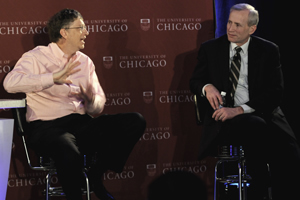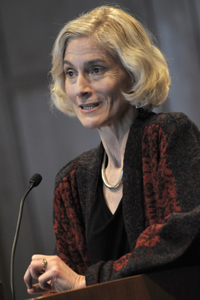Chicago in the News
The Chronicle’s biweekly column Chicago In the News offers a digest of commentary and quotations by a few of the University faculty members, students and alumni who have been headlining the news in recent weeks. Chicago faculty members are some of the most frequently quoted experts, so space allows publishing references to only selected examples. To read many of the full newspaper articles mentioned in this column, visit the In the News column at the University News Office Web site: http://www-news.uchicago.edu.
Votes that could unify or divide
Mark Hansen, Dean of the Social Sciences Division and the Charles L. Hutchinson Distinguished Service Professor in Political Science and the College, was quoted in a Tuesday, Feb. 19 Daily Herald article about the influence of the Democratic Party’s superdelegates on the presidential nominee race between Hillary Clinton and Barack Obama. Democrats established superdelegates in 1982, and party rules allow them to vote at the national convention for any candidate they choose. Their votes need not correlate with the results of any primary or caucus elections. The article reported that some fear the electorate, which is highly energized though evenly split between two popular candidates, could feel betrayed by the votes of the superdelegates. Hansen commented that the superdelegates could serve a unifying role. “After Texas and Ohio, superdelegates could put their heads together and basically decide who’s going to get the nomination based on the popular vote,” said Hansen. “They could take their case to the loser and say: ‘You can either gracefully bow out, or we’re going to announce that the nominee is going to be your opponent.’ They have a pretty strong incentive to avoid a deadlocked convention and not to waste the summer shouting back and forth about who gets to be the nominee.”
 Bill Gates (left), Microsoft Corp. Chairman, and Edward Snyder, Dean of the Graduate School of Business, exchange ideas during a visit by Gates, who was on a five-campus tour in the United States. Gates spoke to a group of Chicago students, who had been selected by lottery to attend the event. Others watched his presentation remotely. Photo by Dan Dry |
|
Gates’ new ambitions
The University welcomed Bill Gates, Chairman of Microsoft Corp., on Wednesday, Feb. 20 to the Graduate School of Business Charles M. Harper Center. Gates spoke to a group of students chosen by lottery to attend the event and those who watched remotely. The Chicago Tribune covered the event, which was part of Gates’ five-campus tour to talk about innovative technology and entrepreneurship, as well as his new role as a full-time philanthropist, building on the work of the Bill and Melinda Gates Foundation. “The foundation work is more at the beginning. But we have ambitious goals. In some ways, the way I get to work with brilliant people at Microsoft or the way I get to work with brilliant people who work on malaria or tuberculosis or microfinance, it’s very similar,” said Gates in the Monday, Feb. 25 Chicago Tribune article. Part of Gates’ visit to the University included meeting with Ian Foster, the Arthur Holly Compton Distinguished Service Professor in Computer Science and the College, who is known as the father of grid computing.
Fate of the Northwest Passage
Eric Posner, the Kirkland & Ellis Professor of Law in the Law School, participated in a mock negotiation between U.S. and Canadian international relations experts, regarding the future of the Northwest Passage and boundary waters in the Arctic Ocean between Alaska and Canada. According to a Tuesday, Feb. 19 article in the National Post, the negotiators urged the two countries to expedite a resolution and their actions to identify shipping lanes, harmonize navigation rules, coordinate search-and-rescue protocols, collaborate to prevent or clean up oil spills, and share surveillance information across the polar frontiers of Alaska and Canada. Posner is an expert in international law and arbitration.
Recipe for success?
Alumnus Nick Meriggioli (A.B.,’85, M.B.A.,’87) was the subject of a Crain’s Chicago Business article published Monday, Feb. 18. The article described Meriggioli’s newest project to reformulate the recipe for one of America’s famous beef franks as President of Oscar Mayer, a division of Kraft Foods Inc. As the business culture changes at Kraft Foods, with division heads now accountable for sales growth and market shares, Meriggioli’s recipe for success will have to prove itself in profits. “This is a very big change, and nothing is bigger for Oscar Mayer than hot dogs. The decision to improve the quality of our beef hot dog was to set us apart from our competition,” said Meriggioli.
 Martha Nussbaum | |
‘Equal respect and fair play’
Martha Nussbaum, the Ernst Freund Distinguished Service Professor of Law and Ethics in the Law School, Philosophy and the Divinity School, wrote an opinion piece about the ideas surrounding the separation of church and state, which was published by the Philadelphia Inquirer Wednesday, Feb. 13. Focusing on the current presidential campaign and the rhetoric of the candidates from both political parties, Nussbaum called for “the language of equal respect and fair play,” rather than “the language of separation. Not only can it clarify why we do not ‘establish’ religion(s) in this country; it can also help explain why some public displays of religion are compatible with our democracy’s basic values, and others are not,” she wrote. Nussbaum argued that not all public displays of religion are out of line with democratic values. The right question to ask, and one that was formulated by U.S. Supreme Court Justice Sandra Day O’Connor, is: “Would an objective observer, acquainted with all the historical and contextual facts, view the policy in question as one that makes a public statement of endorsement or disapproval, sending a message of inequality?”
Evolution’s twists and turns
Neil Shubin, the Robert R. Bensley Professor and Associate Dean of Organismal and Evolutionary Biology, and Provost of the Field Museum, was featured in a front-page Chicago Tribune story that appeared Monday, Feb. 18. The article pictured Shubin with a model of Tiktaalik roseae, based on the fossil he discovered in 2004, and described the new book by Shubin, Your Inner Fish: A Journey Into the 3.5-Billion-Year History of the Human Body. Shubin, who combines paleontology and molecular biology in his evolutionary research, said about his new book: “I wanted to tell the story of the human body from the really deep, ancient stuff—fish, worms, jellyfish, sponges and those sorts of simpler, more primitive life forms.” While fossils such as Tiktaalik roseae help map evolutionary changes, Shubin noted, “We can see in our own bodies the evidence of how evolution took twists and turns that leave us with a body that makes us vulnerable to disease and damage.” An article also appeared in the Tuesday, Feb. 19 New York Times.
Continuing the movement
Dwight Hopkins, Professor of Theology in the Divinity School, was quoted in a story published in the Sunday, Feb. 17 Chicago Tribune. The article reported that new, younger-generation preachers, such as the Rev. Otis Moss III of Trinity United Church of Christ on the city’s South Side, need to strike a balance in their sermons to ensure their messages reach both a newer generation of church members as well as longtime members of their congregations. “I think this generation has to negotiate maintaining that sort of civil rights engagement for justice, because church has to continually be involved in issues of movement and resistance,” said Hopkins. “But they didn’t come out of the 1960s, so their connection is only through parents and memory.”
A personal and economic arrangement
A research paper by Divya Mathur, a Ph.D. student in Economics, was cited in the March issue of The Atlantic. Mathur studied information from a matchmaking Web site and a survey conducted by a market research agency in Mumbai that quizzed more than 6,000 parents and adult children about their attitudes toward marriage. Mathur’s study shows that when upper-middle-class Indian parents arrange a marriage for their son, he is 11 percent less likely to marry a working woman than is a comparable man who enters into a “love marriage,” independent of his parents’ wishes, the article noted. Her work also suggests that marriages based on love, which are currently on the rise in urban India, may influence economic growth.
![[Chronicle]](/images/sidebar_header_oct06.gif)